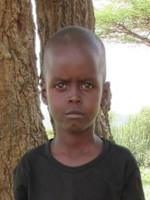

Birthday
October 20, 2020
Age
Age: 5
Gender
Boy


Ltonisa is 5 years old and lives in Kenya.
I live with my mother and father in the Wamba area. The primary language where I live is English. My mother and father are sometimes employed as day labourers. At home, the chores and duties I'm responsible for are animal care, gardening and/or farming, gathering firewood and helping in the kitchen. I like art and/or drawing, ball games, group games and hide and seek. My favourite activity at church is Sunday school. My favourite activity at the centre is doing arts & crafts. I am in the equivalent of preschool. My favourite subject is Art.
Kenya is widely known for its diverse wildlife and large number of national parks and reserves. From the tropical shores of Lake Victoria to the wide plateaus in the east to the tumbled land of the Great Rift Valley and busy coastland, it is a land of many contrasts. Its rich traditional culture and varied terrain make it a favourite tourist destination.
The quickly growing population of Kenya has been matched by robust but vulnerable economic growth, although most people still work in agriculture. Coffee and tea are two of the most important cash crops, and much of the land is used for herding grazing animals that share it with such famous inhabitants as lions, zebras, and elephants. Kenya's many different ethnic groups, such as the Masai, Lao and Kikuyu are widely known around the world, thanks largely to international curiosity and the pride of the local inhabitants for their people and cultures.
Before the coming of the Europeans, Kenya was peopled by waves of cattle-herding African clans. The coastal areas were also home to Arab traders until they were displaced by the Portuguese. Masai and Kikuyu peoples gradually expanded their territories into central Kenya until the British took control in 1895. During World War I, Kenya served as a British base of operations against the Germans in East Africa. Following the Mau Mau rebellion of the early 1950s, Kenya became independent in 1963. Self-rule since then has been largely moderate and peaceful. A disputed election in 2007 caused widespread unrest, and in 2010 a new constitution was adopted.

Compassion’s ministry is focused on what we call holistic child development. This means developing children in all the different aspects of their lives—their minds, bodies and relationships—while giving them the opportunity to hear about and experience the love of Jesus from caring local church staff and volunteers.
Absolutely not! We encourage children and families of all faiths and backgrounds to register in our programs and would never require or coerce anyone to convert to Christianity.
Learn MoreToday, children around the world are discovering that poverty doesn’t have to be their future. Help one more do the same by sponsoring with Compassion!

While we're sorry you could not sponsor this specific child, we would love to help you find a different child to sponsor.
Age: